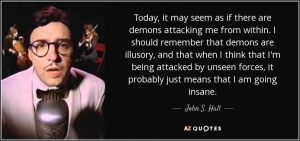 You/I spend most of our lives trying to fix something that never happened. That was never factually true. Even though you keep telling the story as if it were true.
You/I spend most of our lives trying to fix something that never happened. That was never factually true. Even though you keep telling the story as if it were true.Some people call these demons... even though there are no demons... but nevertheless, using the expression: fighting your demons is very accurate, if you don"t believe that demons are entities. There are no entities in the visible or invisible Universe.
And yet we are fighting... I call it an itch... a compulsion... something that makes you weird.
I have known that the story to tell is not true. I have known this for a long while... but this past week, in an impromptu conversation with a long time student of mine, I suddenly saw that finding the untrue aspect of the story is not as easy as it sounds: every story has many many layers, and to catch the layer that contains the lie is more like an art, than science.
It is the untrue aspect that behaves like a "demon".
I am learning this art. I am just beginning even to see the enormity of it.
When I get better at it, I"ll be able to coach people and myself better.
Because yes, I have stories that have layers of lies... and they keep me hostage... I am not kidding you.
 Here is the story we uncovered in the conversation.
Here is the story we uncovered in the conversation.
The person, when he was three years old, was out walking home with his parents. At a junction he wanted to go left... and the parents wanted to go straight. He stomped and stopped. His parents kept walking... straight. The left him where he was: on the corner.
He made a decision that he is alone. That he can"t trust anyone to be with him. And that no one cares about him.
Obviously the parents came back for him... but the story he tells does not contain that little detail.
He is alone, and no one will ever care if he is there... unless.
The unless, in his case, is revealing what decision he made was wrong with him.
He was stupid... and what will fix this is he appears smart, asks good questions, makes himself visible... so visible that he often takes over a whole lecture, a whole class... because that gnawing hole in his psyche must be filled by being prominently visible.
I recommended that his soul correction, "Silent Partner" is all about that... and that he could use the Silent Partner to feel visible, to feel cared for, to fill the hole that the incident left in him.
I have elements of that behavior, I have a lot of the "itch that can"t be scratched"... wanting to be seen as important, wanting to be seen, heard... and, in my experience, be widely hated for it.
 I can manage it from time to time, but not always. The needy child. Hijacking your life at the most inopportune moments.
I can manage it from time to time, but not always. The needy child. Hijacking your life at the most inopportune moments.
It seems to me that your Soul Correction predicts what the incident will be and how you"ll interpret it, and how you"ll try to fix your interpretation... your interpretation that is the untruth.
When I can see what is the untruth, when I can see clearly what is the itch, I can create, with you, a practice that will largely or maybe even wholly scratches the itch... so you can start living with some kind of freedom, grace and ease.
Life reveals aspects that are only visible from one particular vantage point... This itch only makes sense when you consider that it came from an early incident... something that happened and you made up a meaning and you also made up a way to fix it.
 Landmark Education has a distinction: "your strong suit" that goes back to the same incident, but, in my experience, doesn"t validate it enough... doesn"t go deep enough, and has zero compassion.
Landmark Education has a distinction: "your strong suit" that goes back to the same incident, but, in my experience, doesn"t validate it enough... doesn"t go deep enough, and has zero compassion.
One could say that Landmark Education has a lot going for it, but it is harsh, and compassion is totally lacking. Giving lip-service to compassion is not compassion... Obviously I am angry at Landmark... I spent 26 years deeply engaged in Landmark NEVER even getting a glimpse at what would set me free, what would allow me to live life with ease and grace. So I blame Landmark...
It"s true, it"s taken me another seven years to get to where I am now... with regards to clarity, and seeing deeper... deep enough to start to see results both for myself and for my students.
I am working with some people where I am clueless as to what is making them do the things they do. It is most puzzling when I look at two people with the same soul correction... and my "job" is to see what they share, even though seemingly they share nothing.
But unless I see it, I can not get to the seed level of the ineffective behavior: the one that keeps them stuck.
I have had a number of clients with the soul correction: Finish what you start. And I have two now.
What is the commonality?
The name of the soul correction? Their inability, their unwillingness to focus their energies on something that is theirs? What seems to be that they all live in indentured servitude. And when left to their own, seemingly released from the servitude, they escape from it. There is this mortal fear of taking care of themselves and that they would even have a desire of their own to have a life of their own.
They seem to be paying penance for something they did... in the story... and the penance cannot be paid... and the wrong they did probably wasn"t true either.
Don"t envy me for my "job"... even though I like puzzles, I like puzzles I can solve... I even like hard puzzles... this one is putting me on my arse.
The purpose of the ancients, the Kabbalists, ((soul correction is a concept from Kabbalah)) for example, was to help humans free themselves from the invisible strings that keep them small, afraid, uncreative, and miserable.
If you don"t know what it is, you cannot neutralize it... you cannot free yourself.
The capacity, spiritual/mental/DNA capacity one needs to solve these puzzles is called "integrative complexity", which is the ability to hold large amount of information in one"s "RAM" random access memory. Much of that information is everything and their opposite, ambivalent ambiguous, conflicting. Here is an article that explains it in an accessible way: Studies Show That People Who Have High “Integrative Complexity” Are More Likely To Be Successful
This guy, the guy who wrote the article, and I have some invisible connection: we write about the same things at the same time... too often for comfort... for me.
I just read a series of novels about the autistic detective, Jonathan Roper, where he deals with the amount of data by creating a mental construct, he calls Rainbow Spectrum... a storage system that gives access to data... pretty much what you need if you want to be able to solve problems most mortals can"t begin to solve, to help people start working on their soul correction... what I have to do.
It helps being on the autistic spectrum, but it won"t do the job. I have to get better at it.
Because, ultimately the rest of your life depends on it.
No comments:
Post a Comment